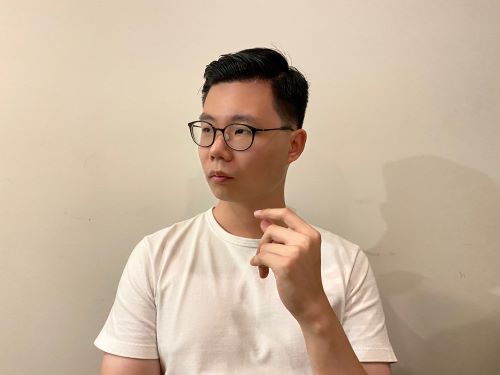In 1985, on the way to a bathhouse, Bà’s headwas a gong eclipsing the sun. His ground-loving flip-flopsmaking a broken ragtime on the street.Walking past. I was five. I had knowna few dangers. Those hot Bāozi coming outof a steamer, for example. Those fast bitesand a scorched mouth. Sān Kuài Qián. Wŭ Kuài Qián.They were five cents back then, dancing on my tiny fingers.In the barbershop, I learned to close my eyeswhen they washed my hair. Let it go, I hoped.Leave 1 cm, Bà said. Then the barber cut it all off.For whom did I want my hair long? Certainlynot girls, for I hated them back thenfor being different from me. How counter-revolutionary it seemed to pee while sitting. Walking past.The bookstore where I rummaged like a squirrelfor new comics, the owner chasing me awaywith a feather duster: Mā never used a feather dusterbut a towel cropped out of a shabby tee shirt.You don’t want the dust everywhere, she said.And that’s how I clean my room now, gladI still have spare, shabby tee shirts. Walking past.At the butcher’s, an assortment of broken duckneckswas a local cuisine we couldn’t affordso we brought home some squishy stuff, still warmfrom a pig, which Mā wok-fried with celery. It tasted goodand was cheap, which was also good. As if goodness is the sameas saving up, as starving ourselves; thin=good. Walking past.A shop, crowded at the Spring Festivalsold kids firecrackers that exploded when hurled at the ground.It sounded dangerous. Use them upbefore grownups confiscated them. Walking past.A decent restaurant. A makeshift chimney. A narrow doorwayto a half-lit staircase, where people lived upstairs, inhaling smokeand dreaming from time to time. Maybe about steam engines.Every now and then, Bà would stop for an acquaintance—Call Uncle!—while I would wait to morph into a dinosaur, a policeman, a truckuntil I ran out of words, was reduced to a tedious kid on the street.Thought everyone was bored like me but they kept movingin different paces and directions. We finally moved on, slippingour shadows into a crowd’s, while I gasped for fresh air amid trousers and fists.Maybe we had a real plan to visit somewhere, I thought,like touring a castle or a graveyard of fighter jets. So many secretsoutside my street that others must have discoveredand got bored with! But we descended the rampto the smell of soap and grown men’s backs. To meit was alluring: the rubbing of Bà’s palmsagainst my armpits, my clogged ears for two days,my penis that wrinkled and lengthened like a snail.Should I tell Bà that an old man was staring at me,long and long? But soon Bà’s head lowered,his voice in a soft, fake-casual mannerlet me to him. And the man smiled,his gold tooth a dark shine through the mist:Yes I will take your son to my school.Yes I will beat him and educate him.
First Time to a Bathhouse
Feature Date
- July 18, 2023
Series
Selected By
Share This Poem
Print This Poem
Copyright © 2022 by Weijia Pan.
All rights reserved.
Reproduced by Poetry Daily with permission.

Weijia Pan is a poet and translator from Shanghai, China. His poems have appeared, or are forthcoming, from AGNI, Boulevard, Copper Nickel, Georgia Review, and elsewhere. A winner of the Inprint Paul Verlaine Prize in Poetry, he is pursuing an MFA at the University of Houston. Weijia is also a winner of Cleaver’s Form and Form-breaking Poetry Contest, and a finalist for the Loraine Williams Poetry Prize and the Laurence Goldstein Poetry Prize.

Winter 2022
Atlanta, Georgia
University of Georgia
Editor
Gerald Maa
Managing Editor
C. J. Bartunek
Founded at the University of Georgia in 1947 and published there ever since, The Georgia Review has become one of America’s most highly regarded journals of arts and letters. Each quarterly issue offers a diverse, thoughtfully orchestrated gathering of short stories, general-interest essays, poems, reviews, and visual art.
Never stuffy and never shallow, The Georgia Review seeks a broad audience of intellectually open and curious readers—and strives to give those readers rich content that invites and sustains repeated attention and consideration. The physical journal is made to last, expertly printed on fine paper and perfect bound for durability and ease of shelving in one’s library, and the content is made to last as well: over the years, many subscribers have told us that The Georgia Review’s offerings prompt them not only to read every issue cover to cover but also to return to those issues and to share them with friends and colleagues.
Pulitzer Prize winners and never-before-published writers are equals during our manuscript evaluation process, whose goal is to identify and print stories, poems, and essays that promise to be, in the famous words of Ezra Pound, “news that stays news.”
“The Georgia Review is the only magazine I read from cover to cover. In other publications I usually find several things I really like; in The Georgia Review I love nearly everything.”
—Fleda Brown
Poetry Daily Depends on You
With your support, we make reading the best contemporary poetry a treasured daily experience. Consider a contribution today.



